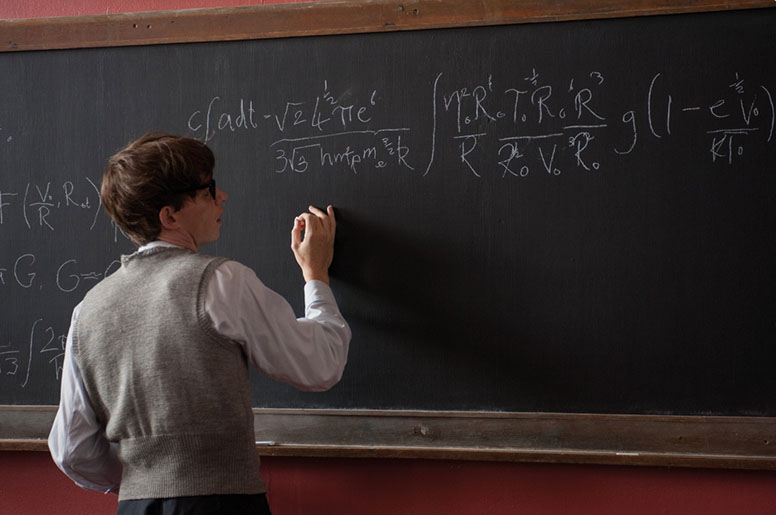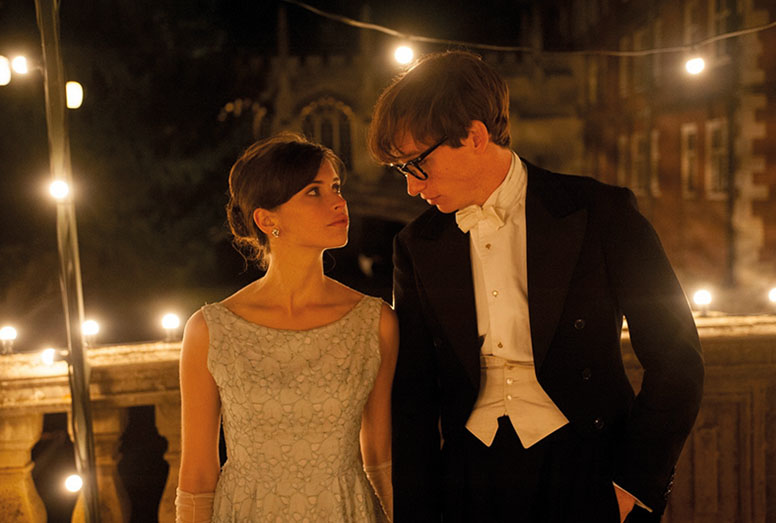Born 8 January 1942, exactly 300 years after the death of Galileo, Stephen Hawking – cosmologist and author of A Brief History of Time – is one of the great geniuses of our age. A brilliant and charismatic student, while studying for his PhD at Cambridge he was diagnosed with amyotrophic lateral sclerosis (ALS) and given just two years to live. A new film, out 1 January and tipped for Oscars success, reveals his extraordinary story.
Q: One of the most incredible things about Stephen Hawking is how he has lived with his disease. Is this down to his optimism?
A: Hawking was diagnosed aged 21 and given two to five years to live – that was 50 years ago. I imagine it’s to do with the specific strain of the illness, but I’m sure there is also positivity and optimism in the mix, plus an extraordinary mental life that is always looking forward.
Q: How was it portraying a real person?
A: Mildly terrifying! As I know they’ll be the ultimate judges. But I wanted to meet him to learn as much as I could. I’d spent four months meeting with specialists and people dealing with the illness. I read everything I could and talked with Stephen’s family, so when I met him I was really nervous: I spent the first half an hour with him telling Stephen Hawking about Stephen Hawking!
He can move so few muscles now that it takes him so long to speak. In maybe three hours he said eight sentences to me. A lot of it was spent observing and sitting together. Even though he is able to move so few muscles he has the most charismatic face I’ve ever seen. To find the glint in his eyes, that mischief and humour, and try to channel that was really important.
:: EXCLUSIVE Edition’s Jenny Shelton on being an extra in The Theory of Everything ::

Q: You portray Hawking at different stages of the disease. Was there a big challenge in that?
A: The problem with filming is that you don’t shoot chronologically. In photos of Stephen, he gets substantially skinnier through the years, so there was a question over how to achieve that. I worked with our make-up and costume designers and would wear collar shirts that were tight, and make- up that made me look healthy, then gradually the shirts would get bigger.
The problem with ALS [motor neuron disease amyotrophic lateral sclerosis] is that nobody knows exactly when it starts. I came to the conclusion that in the beginning of the film it is already there in some shape, in his hands or his slightly ungainly gait. When I spent time at the ALS clinic meeting people with the disease and getting to know their families, the details were the extraordinary things.
Q: The love story between Stephen and Jane is one of the highlights of the movie. Were you and Felicity (Jones) close beforehand?
A: Yes, our careers started at the same theatre with the same artistic director. For the movie, we started with our friendship and jumped into the intimacy of their relationship. Jane did everything for Stephen. She became almost an extension of him. Not just his body, but his mind as well. She really is an incredibly bright and brilliant woman.
Q: Les Misérables was a huge movie for you in 2012. Do you think Theory will change your life?
A: Hopefully each new piece of work changes people’s opinion of you or pushes you to new places and forces you to learn brand new skills. I’m sure that this film came about as a result of Les Misérables – without it I doubt I’d have been considered to play the role of Stephen Hawking.
Q: How did you like filming in Cambridge?
A: It was amazing for me because I was lucky enough to go to university there myself. It is a breathtakingly beautiful place, with history everywhere. It reminds you of time due to its amount of history and heritage. Such formidable minds have been through that place. The idea of the film is that we are telling this very intimate micro story about Stephen, and at the same time the frontiers in his mind are huge. It is just like Cambridge, which has this intimacy, but when you look at some of those buildings your breath is taken away by what human beings can achieve.
“Their story is so special and they allowed us in and enabled us to tell that story as well as we could”
Q: Hawking and his family came to watch the May Ball scene. What was it like having them on set?
A: It was so intimidating, but at the same time amazing! Their story is so special and they allowed us in and enabled us to tell that story as well as we could. Hawking also gave us his voice to use in the film. We were going to use a synthesised version, but after seeing the film he offered us his real voice.
Q: Did you get word from Hawking after he watched the movie?
A: He did an interview and was really nice about it. It meant the world to me that he enjoyed the movie. The greatest thing I’ve taken away is what I’ve learned from the ALS patients I’ve met, particularly Stephen; a man who was given this diagnosis but who chose to live his life fully. Stephen says when your notion of time changes like that, the years after are gifts and he feels every minute of his life.
:: The Theory of Everything is in cinemas 1 January.

